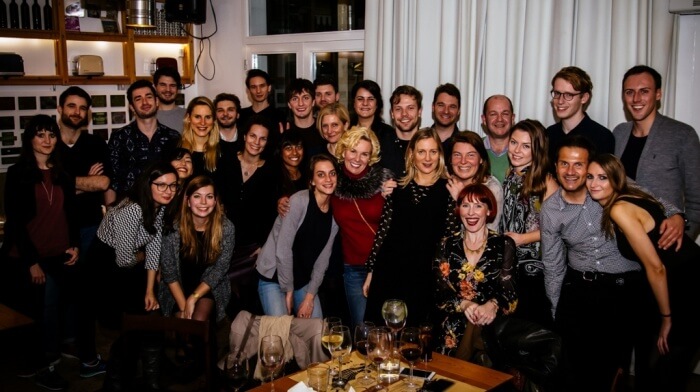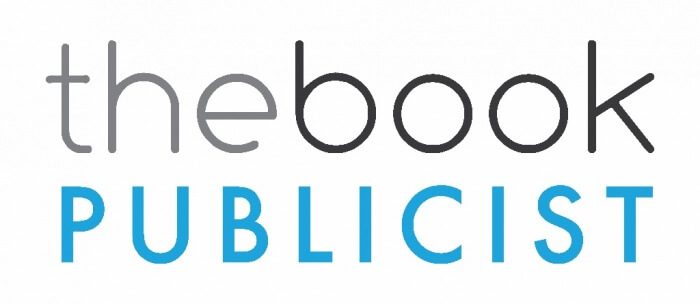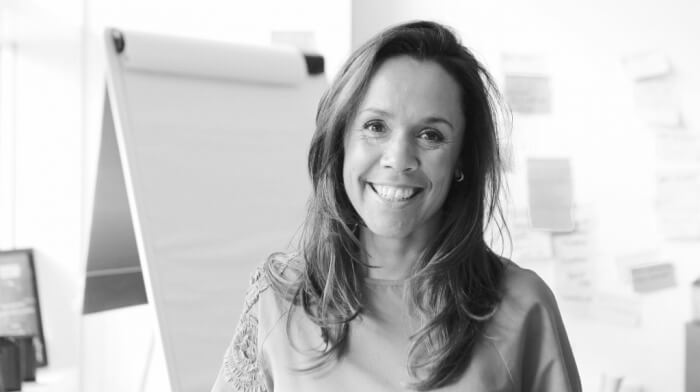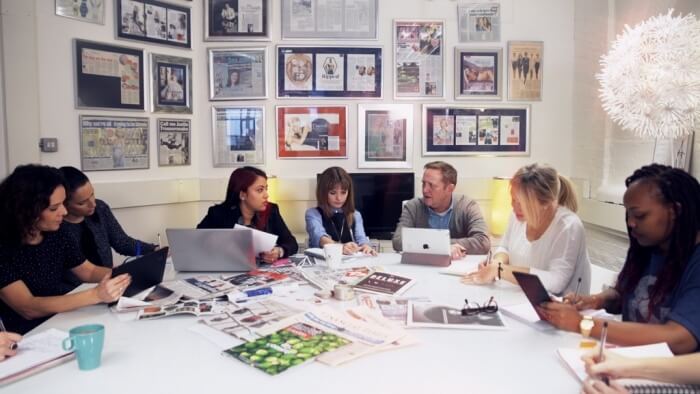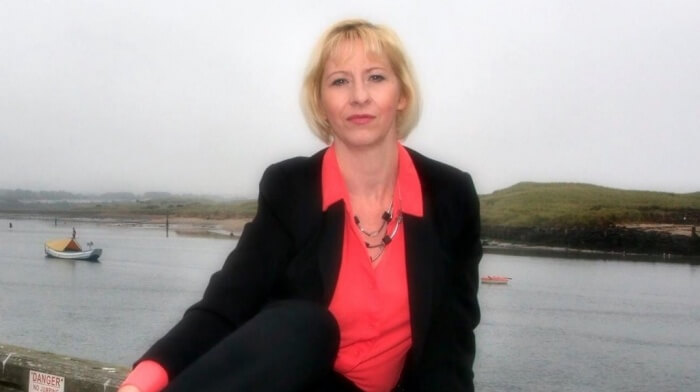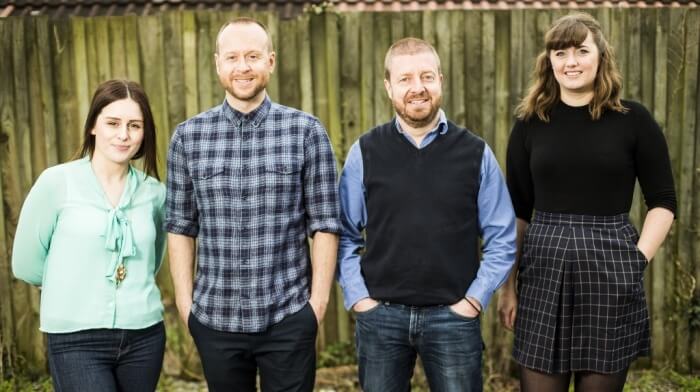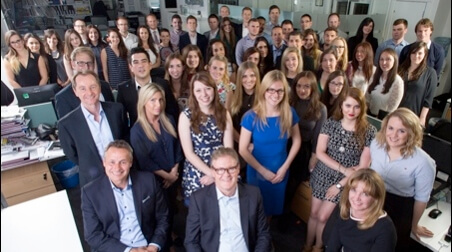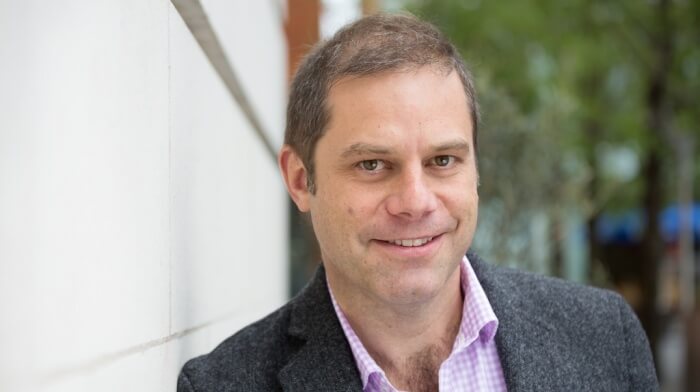A strong PR campaign could make your business, but choosing a PR firm is tough. Here's our exhaustive guide to the UK's best PR firms for small business.
The Best PR Firms For Small Business
A strong PR campaign could make your business, but choosing a PR firm is tough. Here's our exhaustive guide to the UK's best PR firms for small business.

Businesses understand the value of a strong PR campaign which creates interest and drives revenue. But PR is expensive and, ideally, it's good to know what you're getting before you invest hard-earned cash in publicity.
To make things clearer we asked some of the UK's top agencies and freelancers for try-before-you-buy insights into how they work, what they charge and what you should expect in return. The firms are listed in alphabetical order.
Ballou PR
What kind of business is your ideal client?
Our ideal clients are high-growth and innovative technology companies. We especially like to work with companies that have a really strong mission statement and a lot of passion behind what they’re doing.
How big is the team and where are you based?
Ballou is a pan-European agency with more than 30 employees across three offices in London, Paris and Berlin.
How do you on-board new clients?
We always have a thorough kick-off meeting, preferably in-person, in which we extract as much information about the company and their PR needs as we can. The more insider knowledge we have, the better positioned we are to do our job. It’s also a great opportunity to meet the team and spokespeople we’ll be pitching to the media.
During the on-boarding process, we discuss with all our clients how they like to work best. We want to integrate our PR campaign into their business as much as we can, and this involves adapting to their preferred working processes.
How do you manage them after they get started?
We tend to schedule one call every fortnight with clients to catch up on activity, and we produce an activity tracker that is updated at the end of every week.
Please give some indication of your fee structure
We work like any other professional service provider and charge for our time. Each employee has an hourly rate, which we are very transparent about, dependent on their level of seniority.
Monthly retainers are calculated based on the hourly rates of their account team, which typically consists of an account director, an account manager and an account executive, depending on the size of the account.
What results should clients expect?
It definitely holds true in PR that you get out of it what you put in. The more we understand your company, the more time you can spend talking to media, the better able we are to execute a successful campaign and get meaningful results for your business.
Give us an example of work you are proud of
We launched an analytics startup in the UK, and have managed to secure a strong and steady drumbeat of coverage over the past two and half years, which has led to some outstanding pieces including profiles in The Guardian and The Wall Street Journal and quotes featured in TechCrunch and on BBC Radio 4, among others.
In this particular example, we’ve been really integrated into the business from day one and have developed a really thorough understanding of the company and its needs. This not only makes working together much smoother and easier it also means our PR campaign is much more likely to be a success.
The Book Publicist
What kind of business is your ideal client?
We generate media exposure for thought-leaders. Most of our clients are authors, speakers and entrepreneurs. All of them are experts in their particular field. By profiling them as a go-to expert, we build their credibility and media brand, which in turn promotes their business, books and other products.
Many are business books written by entrepreneurs, speakers, executive coaches, consultants and academics, but we also work on lots of self-development titles written by psychologists, psychotherapists and life coaches.
People write books not to necessarily become a best-seller, but to share their expertise and add credibility as part of their wider marketing strategy – they see their book as the best ‘business card’ they could have.
We therefore had lots of authors wanting to continue working with us beyond their book launch in order to keep profiling themselves as the go-to expert in their field.
In response to this we launched another service, ViPPR (PR for very interesting people), and we’re now lucky enough to work with (and learn from) dozens of fascinating world-leading experts every month.
How big is the team and where are you based?
The company has been going since 2009, but we’re still a relatively small team. There are currently just seven of us in the office, but we are in the process of expanding, so that is likely to increase in the coming years.
We have just opened our new office in Hay-on-Wye. Hay is known as “the town of books” and is home to a world-leading literature festival, so it is a logical place for us to be, and it is amazing to be right in the heart of the action when the town is taken over by famous authors, speakers, actors, musicians and artists every year.
How do you on-board new clients?
We do meet some clients face-to-face, but actually we find that telephone and Skype calls allow us to work in a way that and is more efficient and cost-effective for clients. We have clients based across the UK, Europe, America and Australia, so we have to embrace technology that allows us to work with them closely.
For every client, the team will take the time to get to know their book (if they have one), their business and their work before we kick-off.
We then think it is important to get the client’s own views, as often it is the person behind a book or a business that is particularly interesting, so we will brainstorm ideas for angles and potential features and interviews that would work well for their target media.
How do you manage them after they get started?
We provide clients with a weekly update on activity and opportunities, but will also speak on a day-to-day basis when opportunities arise.
We find campaigns work best when we’re able to liaise closely with clients – it not only allows us to react to news stories and opportunities quickly, but also enables clients to let us know what is working for them (e.g. what coverage is driving sales or generating enquiries) so we can focus our efforts on what brings them most value.
We subscribe to a media cutting service that captures all the mentions of the client, their books and their businesses in the press, so we share this information with clients so they can amplify the reach and value through their own social media presence.
We also maintain a live online record for each client, to showcase the places they have appeared, including KPIs like circulation, readership figures and social media shares, which many clients find useful when it comes to business development.
Please give some indication of your fee structure
Our typical campaigns cost £1,800 (+VAT) per month. Most book launch campaigns will run for 3 to 6 months, but many clients will continue to work on a longer-term basis.
We have talented and experienced copywriters, so our busier clients also use our copywriting service to help turn their ideas into print ready features.
Our social media packages are £250 per month.
What results should clients expect?
As with any PR campaign, it is difficult to predict exactly what kind of results you can expect, but we include a minimum guarantee of 9 pieces of coverage in any 3-month period to reassure clients that they will have a return on their investment.
It is important to stress, however, that this is a minimum level and not a target, because in reality we have never failed to exceed this level and 20 to 30 pieces is more common for a launch campaign.
Give us an example of work you are proud of
Every campaign is different so we will always work to get clients featured in the media that is most valuable to them.
We have had clients featured on BBC Breakfast television, ITV’s This Morning, Sky News, BBC Radio 4 Woman’s Hour and every national broadsheet and tabloid newspaper in the UK, but it will also sometimes be a case of carefully targeting particular verticals or niche publications that are perfect for that individual client’s book or service.
· A recent 3-month campaign for a new app resulted in 53 pieces of media coverage, including features in: The Sun, Daily Express, Sunday Times, BT, Daily Star, Times Online.
· 8-month PR campaign for a salary benchmarking site resulted in 101 pieces of media coverage including FT, Telegraph, Independent, City AM, Evening Standard, Sun, Metro, Cosmopolitan, Marie Claire.
· On-going PR for wellness expert and author. Coverage includes interviews and features in over 100 publications including Daily Express, Guardian, Telegraph, Times, Esquire, Independent, Star, Irish Times and dozens of interviews with regional, lifestyle and radio programmes.
· A recent 3-month book campaign for a parenting title resulted in 61 reviews, interviews and features including: Times, Guardian, Daily Mail, The Sun, Express and dozens of lifestyle, parenting and regional media.
Bottle
1. What kind of business is your ideal client?
For us, it’s less about the type of business, or industry. Rather it’s company culture that sets the ‘ideal’ clients apart.
We love working with ambitious, creative, brave clients - ones that have a strong point of view, firmly held opinions that they are willing to share (even if they are contentious) and values that they hold dear and emulate in all they do. These kind of clients know what they want and work in partnership with us to succeed in achieving this.
How big is the team and where are you based?
We have a team of 24 and by July it will be 26. We’re growing, both in our PR team and also in our content team. This demonstrates we’re not only getting things right, but how important content is to our offer. We’re based south of Oxford on a science park and are surrounded by lots of very clever people like us. And trees. It’s rather lovely actually.
How do you on-board new clients?
It all starts with a brand immersion session. This is where we use a range of exercises in a workshop style to really get under the skin of the client, their brand and their stories. We test out the breadth and depth of their narrative, and test them on their willingness to ‘go there’ – i.e. the outer edges of the topics. And then we make sure we’ve conducted our own ‘mystery shopping’ – meeting customers, trying the product, road testing their service etc. This is often where a lot of our insight and inspiration for stories comes from.
How do you manage them after they get started?
At Bottle we start at 7:30am so we’re ahead of news-jacking opportunities before the other PRs - and ready to respond to urgent opportunities early in the morning. Our newsroom model requires a new way of working for lots of our clients who haven’t worked like this before. However clients love it and quickly realise that the early birds really do catch the worms.
And given that most of our clients aren’t located in Oxford, we do a lot of weekly conferencing / skype calls and Google hangouts. But you can’t beat a face to face meeting, so we always try to ensure these are in the diary at least once a quarter if not monthly.
Please give some indication of your fee structure
The Bottle newsroom is central to what we do and we therefore ‘throw it in’ as part of any fee proposal.
The work that comes out of this process however, depends on the scale and ambition of the client. Some just want big campaigns, others want planned editorial, others want the daily vigilance of reactive storytelling and others want to grow their online influence and are more motivated in backlinks from an obscure website with a high domain authority than a print piece in the business pages of The Times.
And some, want it all. So there really isn’t a ‘standard’ fee structure. But we work with the client to define their ‘challenge’ (e.g. visibility, authority, distinctiveness) and the right strategy, and build the fee structure based on that.
What results should clients expect?
Better results than they’ve had before! Sounds flippant, but it’s true. New clients, especially ones who have used other agencies, are usually blown away with the results. We track all results against our strategy and visualise the impact we’re making, so it’s easy to see the progress. Having an insight team really helps with this too.
Give us an example of work you are proud of
One client was a tech provider and had never been in the national press, but had a target market who they wanted to reach in their work mode (the trade media) as well as their leisure reading (the nationals).
Our strategy was therefore two pronged – deliver an original B2B strategy whilst coming up with stories that had popular culture at its heart. Therefore, the stories could meet the trade journalists’ needs, as well as grabbing the attention of the national news desks. This client went from achieving two pieces per month in trade, to over nine pieces a month.
Another client was very B2B focused and hadn’t done much digital engagement work. We secured an interaction of over 40,000 people taking part in a branded quiz for this client. This gave them a noticeable spike in their online site traffic which they’d never delivered before through PR.
And for another client we secured just over 1m views of a video promoting a tyre – yes, one of those black rubber things that aren’t known for being sexy or shareable. Not bad for less than £30k including the filming, production and social media spend!
Bratton PR
What kind of business is your ideal client?
My ideal client provides pioneering technology to tackle impactful present day problems, such as cybercrime and identity theft. These are growing areas of concern for so many people today – businesses and consumers alike - and it’s exciting to work with the good guys to try and overturn the bad.
How big is the team and where are you based?
There are three of us based in Buckinghamshire. I also have a network of experienced freelancers that I call upon when needed, for larger or specialist projects.
How do you on-board new clients?
We’ll have an initial meeting via phone or face-to-face to discuss their PR objectives; USP and other product/service differentiators; company background, i.e. why and when it was founded and who by; competitors in the marketplace and available PR budget.
From this information, we would then put together a PR proposal for the client’s consideration.
Once approved, we would start planning an introduction to the media linked to the next major upcoming announcement, scheduling press briefings with the company’s senior spokespeople – which they would need to attend. I call this process ‘putting a face to the company’ – the first step in building long-term relationships with influential journalist contacts.
How do you manage them after they get started?
At a minimum we hold twice-monthly phone calls for a status update, as well as to discuss any new client developments or changes to their messaging. For important, more complex announcements, we would schedule a weekly status call, to ensure no opportunity is missed. These calls are supported by daily email exchanges, monthly PR reports and quarterly review meetings face-to-face.
Please give some indication of your fee structure
To secure the best results from PR, clients should initially commit to a 6 or 12 month contract with a monthly retainer fee that reflects their specific requirements (fee will be agreed at proposal approval stage).
This gives us the necessary time to educate target journalists on our client’s capabilities and also to build a mutually beneficial relationship between both parties. Media coverage often starts within the first month of a client contract being signed – and levels of coverage gain momentum as the media become more familiar with the company.
More often than not our clients are delighted with the results they receive from us and some have used our services for more than 10 years.
What results should clients expect?
More than 100 articles in key publications/portals each year, focusing on those media that our known to be read by our client’s customers and prospects.
Give us an example of work you are proud of
PR objectives:
- To launch a US-HQ client to the UK market, focusing on the unique capabilities of its cybersecurity technology solution.
- To highlight the consequences of the current data breach crisis, before educating target audiences on how this client’s technology can be used to identify active network attackers.
- To demonstrate how and why this client’s technology performed better than competitive solutions (without being negative about competitors).
Results:
- Over 100 articles published in just 10 months across a range of media outlets including The Times, the Financial Times, Computer Weekly, The Register, SC Media UK, ITProPortal and Infosecurity Magazine.
- Leading journalists quickly became familiar with this client’s offering and regularly requested bespoke comment for use within cybercrime articles they were working on.
- Our marketing contact at this client referred to Bratton PR as his “secret weapon in the UK” and said we are “more productive and responsive than any agency I’ve retained.”
Cherish PR
What kind of business is your ideal client?
We love working with innovators; businesses that are changing the way that we as consumers behave, altering habits so to speak. We’ve been really fortunate to work with some amazing brands in this respect.
From changing people’s dating habits through our work with match.com in the Noughties and latterly long-term relationships with eHarmony, changing the way business funds its ideas with Indiegogo or being at the forefront of the eReading revolution with Kobo.
Secondly an ideal client is one that really engages with the PR process, being ambitious and working with us to realise those ambitions. We’re working with Laundrapp at the moment and it’s a really good partnership because we’re really ambitious together and the results are great.
How big is the team and where are you based?
We’re a small team of 10, based in Paddington.
How do you on-board new clients?
It may sound obvious but the first step is to become a customer, use the service and see it from the end-user point of view.
Then we really begin with a kick-off session which can be two hours or two days. It’s important to get under the skin of the business, find out the processes, and understand the people and how they like to work – finding out that the CEO likes updates via text for example.
We also ask for pet peeves, to avoid them, and clients absolute, perfect product, so that this also becomes an unofficial target.
We also explain that onboarding new agency is a learning curve and it’s better that we make mistakes and learn from them early on. Setting out this process means that we get to know each other as clients, as businesses and as people within a context of learning. It’s a really positive experience.
How do you manage them after they get started?
We’re pretty transparent so we run WiP reports on Google Docs and work from them. It means that a client can go into them at any time and see the work to close of play that day. This is really important when you have clients or partner agencies working across different time zones.
Business is so fast paced today that we just cannot afford to keep clients waiting to the end of the month to know what has been achieved. It’s also why we tend to run a 30minute call every week or fortnight.
Reviews are important too, so every Quarter or at the end of a specific project, we’ll run a full review with analysis of results by agreed metrics and also insights and learnings that can be applied to the next stage in the programme.
Please give some indication of your fee structure
We’re a bit like hairdressers. We bill hourly for time spent and based on the level of Consultant that works on the programme. From Junior Consultants to MD, we all have a role to play on the clients and we bill accordingly. We also charge expenses to cover any bought in services or products. We’re unlike other agencies in that we don’t mark-up our costs.
A long time ago we realised that most clients don't really care how much time we spend on a campaign as long as it delivers the results they expect. So whilst we do budget by time spent, our billing equates to a set of results, agreed at the start of the campaign.
Based on our measurement criteria, we agree volume, media tier, messaging, scale and quality score as the output equal to our client’s investment. So they can budget and we have a clear focus on what must be delivered. It keeps the whole team on track and makes sure there are no surprises.
What results should clients expect?
They should expect a set of results that we agree with them on at the start of the campaign, although we will always aim to over-deliver. If you have set out in partnership with the client what they will receive, then we’ll deliver it, even if it means spending more time or taking a little longer than anticipated.
Also we’ll aim for it to be a positive and fun experience because we’ll want them to keep working with us of course.
Give us an example of work you are proud of
A couple of months ago we were brought in to a client’s marketing team to manage the announcement of their international expansion. We tried the product and spent some time with the CEO understanding the strategic importance of this news to the business, which tuned out to be the story’s impact on their longer term funding round. We also discussed targets and they told us that they had never appeared on TV. So we made that a tactical goal.
By understanding the announcement and its importance in the longer term of the business, we repositioned the story, focusing it as much on territories planned as contracts agreed. We also focused on the unique way the business was scaling, in doing so positioned the business as growing and transitioning.
The results included three TV features on Sky News, BBC and Cheddar TV, an online news channel focusing on the tech sector. These three opportunities delivered funding enquiries directly into the CEO although this was not implicitly stated in the items.
The story was also widely covered across the national press and importantly within key business and finance media online. Best of all was a three page feature in one newspaper business section with the CEO featuring on the cover. I think that one went onto the wall of their boardroom!
Claire Shiels Media
What kind of business is your ideal client?
I specialise in assisting start-ups and small businesses with their PR, either at the launch or growth stages. Watching them succeed and develop from the start delivers immense job satisfaction and ensures that I’m invested from a personal perspective as well as professionally.
How big is the team and where are you based?
As a freelance PR based in rural Northumberland, technology has been vital in growing my global client base and enabling me to communicate with clients and media from San Francisco to Southsea. I currently work with around 30 clients across a variety of package offerings.
How do you on-board new clients?
All new enquiries are driven by my online presence, client referrals, journalist referrals or repeat briefs from existing clients. Introductory briefs and supplementary information may be given in person, over the telephone, via email or on Skype.
I find that at this stage, it is important to get a feel for the company in question and the client, to understand precisely what is required and how they want it delivered.
How do you manage them after they get started?
Quite simply, I’m always available. I mean 24/7. The media doesn’t work 9 to 5 and in my opinion, neither should a PR. I will regularly wake at 4am and engage in conversation with an overseas client.
I’ve arranged media interviews from a sun lounger on Fuerteventura and responded to journalist requests on family country walks in Conwy. As it’s just me, the client knows that every email they send and every phone call they make will be answered personally.
Every piece of feedback I receive from a journalist is forwarded to the relevant client and my retained clients receive a detailed review every three months.
I’ve received plenty of vague explanations and empty promises from PRs to whom I’ve outsourced work in the past and frankly, clients deserve a much more transparent and high quality service than that.
Please give some indication of your fee structure
I believe I am one of only a handful of PRs in the UK to offer services on a true pay by results basis, with my fee structure outlined in detail as transparently as possible on my website.
In addition to the traditional monthly retainer, clients signed up to my “Opportunity PR” package will only ever pay a flat fee if they appear in a pre-agreed article. Others, signed up to my “Pay By Results” package receive a more involved service and pre-agreed fees are charged per inclusion.
Clients are aware of what my maximum fee could be, at the beginning of a campaign.
What results should clients expect?
Pay By Results can be a risky business model, so I cherry pick all of my clients very carefully, based on what I believe are media-worthy stories. For this reason, I advise clients to anticipate around a 50 percent success rate for inclusion.
Give us an example of work you are proud of
One client was a physical sweet shop in the UK, which also had its own, separate online presence. Approaching Christmas, I pitched its unusual Advent Calendar for a feature on ITV’s “This Morning” programme.
The presenter declared it to be one of his favourites and the client reported that her phone immediately began ringing off the hook with orders for the product, from around the country. The sweet shop staff were finally forced to close the doors for two days, to fulfil all the 250 orders.
Inside Media
What kind of business is your ideal client?
We love working with people who are passionate and knowledgeable about what they do, as this makes our work genuinely interesting and fun. With small businesses these are often the people you encounter as frequently they have founded the business and have invested financially and personally to make it a success – it really means something to them.
Regardless of industry sector, other features that support a successful working relationship are being open to ideas, having realistic expectations, and a clear view on the (merited) reputation they hope to build.
How big is the team and where are you based?
Based in Bristol and a team of four people, Inside Media is an award-winning PR/communication agency that helps a range of businesses and organisations achieve their objectives through communication – be that media relations, social media management, public affairs, events and/or crisis management.
How do you on-board new clients?
We are never prescriptive about how people work with us – either at the outset or at any point in our relationship.
Collaboration works best when the contact and communication between us and the people we are working with is seamless. That is best achieved by adapting our approach to how they work – for example, their reporting cycle and ways of working.
When we do this we find that the conversation between us is regular, relaxed but also candid. It is something that becomes part of their routine rather than another task that they have to find time to fit in.
How do you manage them after work starts?
In terms of routine contact, the format should enable an open exchange of views, so face-to-face makes sense and develops the working relationships.
In terms of supporting documents and materials – no client is ever keen to see a disproportionate effort spent (at their cost) on producing lots of reports and updates.
Our intention with any report produced to support a review of activity is to agree the appropriate level of detail to include, to feature only relevant and meaningful information and to ensure the balance of the discussion is focused on directing future work, rather than a protracted post mortem of everything that has happened, other than to capture the lessons learned.
Please give some indication of your fee structure
At the outset we talk with people to understand what success looks like to them and then we match that against our experience and insight to test whether that is a realistic expectation. This is a useful process in its own right and also means that there are few, if any, surprises as work is delivered.
In terms of how work is (typically) costed - we have a day rate that is very competitive and discounted (by 20%) if the client is a charity or third sector organisation.
All of the team are experienced so we do not have different rates for different people – the same capable and qualified people are involved from first contact and throughout.
We don’t add anything to cover routine expenses and we don’t mark-up third party costs.
What results should clients expect?
Whilst there are variables and no guarantees, an experienced agency will have a good insight on what is possible and the small business should be comfortable that it is a worthwhile result – not just against what other agencies might have delivered, but also against what would have been possible had the same money been invested in another way.
What should also be demanded is an evaluation of relevance and impact. When considering the results delivered we will ignore coverage to an audience that is not relevant to the business in question – for example, a tourism destination might value being featured in international media but that will not serve the interests of a professional services business in particular location.
We also discount coverage that does not feature one or more of the agreed messages that it is intended are communicated.
Give us an example of work you are proud of
We did a small project at short notice that was fun and was recognised in the category for ‘best low budget campaign’ in the PR industry awards.
Our client was a fancy dress business seeking to create an identity that could be regarded as a discernible brand (over the many small independent suppliers that operate in that sector).
Clearly fancy dress is all about visual impact, so we worked with our client, a popular summer festival and a charity to create a Guinness World Record.
Through social media in the run-up to the event we recruited over 4,000 people to take part and festival headliners were encouraged to post/retweet about the record attempt.
On the day the professional news photography and video content we arranged was directly shared with the regional and national media.
With 867 people aged 10 months to 73 dressed as Superman in a single location a new Guinness World Record was established and more importantly our client reached a potential audience of 44 million people.
Coverage included five national newspapers; websites like BBC News, Mail Online and the Huffington Daily Post; and three broadcasters.
PHA Media
What kind of business is your ideal client?
Our core business is telling stories. We love working with brands, businesses and individuals that have a good story to tell. We also specialise in helping those under media scrutiny protect their reputations. We’ve worked with a wide range of clients from celebrities to charities and tech start-ups to big corporates.
How big is the team and where are you based?
We are a team of 70 people split into several teams with different specialties for every client’s needs.
We cover Consumer and Lifestyle, Technology, Entrepreneurs and Business, Sport and Leisure, Crisis Management and Strategic Communications- so our expertise is broad.
Outside of our PR capabilities we also have a Public Affairs team as well as a Creative Strategy team that covers social media, website design and building, animation and video. We are based in the heart of Soho in London.
How do you on-board new clients?
We like to get under the skin of a new client, so we can complement their team as much as possible as a partner to their business.
When we kick off with a new client, we will take time to get to know every aspect of the business and how it works. We might spend a day with the company or ask them to fill in a detailed Q&A so we can understand everything about them and what makes them tick.
This pre-research stage will be followed by a kick off meeting where we present a timeline of PR activity, with reactive and proactive strands, for discussion. By mapping out our activity, new clients can understand exactly how we will be help them achieve their goals.
How do you manage them after they get started?
Some clients like regular meetings, some like weekly written updates- we base our contact on a client’s preference.
However, as a general rule of thumb, we monitor and measure the success of the campaign through weekly catch up calls, once a month face to face meetings and fortnightly written updates. We feel the best relationships are born from regular communication and will always chose a coffee with a client over a lengthy email chain.
Please give some indication of your fee structure
We work on a monthly retained fee, with pricing based on the client’s brief and the level of activity we believe they need to reach their goals. However, as a starting point, our standard monthly fee is around £5,000 + VAT a month.
What results should clients expect?
Clients should expect a consistency and enthusiasm from us. The team at PHA are all incredibly driven and passionate about what we do, so will always go the extra mile for clients.
Give us an example of work you are proud of
We had a relatively unknown client come to us two years ago with a specific goal, to be on a particular TV programme. Throughout the course of the campaign, we built the client and the client’s business up to become recognised across the mainstream media.
We then successfully pitched the client into the Directors and Producers at this TV programme and the client later launched a very successful media career.
Six Degrees
What kind of business is your ideal client?
Six Degrees specialises in helping STEM-based businesses - those built on science, technology, engineering and maths. We pride ourselves on close working relationships and many of our clients have been with us for over a decade.
What sits at the heart of that are relationships built on trust and understanding, and if those can be established early it makes working with any client a whole lot more rewarding for both parties.
Working with start-ups requires a degree of emotional investment which often means going beyond the call of duty. That extra demand is made easier though by the sheer excitement of working with highly driven entrepreneurs who are disrupting marketplaces, and helping them to bring their stories to the wider market.
We’ve just launched a new way of working with these start-ups to help them get more out of PR, called the Start-Up PR Clinic, but more on that below.
At the same time, working with more established companies can be equally exciting, particularly if that entails taking a deeper approach to their communication.
How big is the team and where are you based?
We are a small to medium sized agency with 12 consultants, based in the heart of Reading (25 minutes away from central London by train).
In the last year, we were actually recognised as one of the top three Outstanding Mid-Sized Public Relations Consultancies by one of the governing bodies for the PR industry, the CIPR. The team has a diverse mix of skills and experiences, and is made up of communication specialists, former journalists, engineers, technical writers and science graduates.
How do you on-board new clients?
Often the first meeting we have with a new client is a messaging workshop. It’s a face-to-face meeting that is designed to dig deeper into the company’s values, goals and objectives. It has a brainstorm format to it, which most clients enjoy.
The learnings from that meeting are then overlaid with a media and market audit that we carry out for them which, among other things, looks at the competitor landscape as well as ‘share of voice’ on relevant topics that they want to be associated with.
That then allows us to put together a comprehensive strategy document, as well tactical campaign initiatives that can deliver on those, both over the short term and long.
How do you manage them after they get started?
Everything is tailored to the clients’ needs and expectations. Calls can be organised weekly, but we typically suggest bi-weekly or monthly calls, with written monthly activity reports, detailing current and completed activities.
Accountability is one of our core values, so our clients will always have access to detailed measurement figures around our efforts and the results that we get. Measurement is one of the first things we talk about so that we can benchmark our efforts and prove the value of PR and communications.
Please give some indication of your fee structure
For most clients, we work on an annual retainer basis, either working to an agreed set of deliverables or one that works to a time-based billing model. Both are entirely scalable and can be tailored to suit whatever budgets are available.
We’ve always found retainers tend to be more cost effective for clients in the long run and ensures a regular drum beat of PR activities. It also enables us to get a much deeper understanding and avoids ‘stop-start’ learning processes, meaning we are better equipped to identify opportunities for clients as they arise.
For those clients that just have a one-off announcement to make or want to promote something specific, we offer a project-based fee, again based on an agreed set of deliverables.
We’ve just launched something for start-ups who we know often have limited budgets and cannot afford to commit to a retainer with a PR agency.
We’ve called it the Start-up PR Clinic, a cost-effective project-based approach, that aims to support start-ups in critical moments like product launches, investments announcements or to attract the attention of new investors.
What results should clients expect?
It really depends on what their objectives are. We offer many different services from crisis management to media training workshops to different kinds of event support through to building internal communication programmes.
For many, it will be about securing media coverage in relevant print and online publications and building stronger relations with journalists and other media influencers.
Whatever the objectives are though, we always aim to put metrics in place to measure that and ensure we deliver on expectations – whether that is increasing their share of voice in the media, tracking engagement of a particular piece of content on social channels or driving interest in a downloadable research document on the client’s website.
We will always sit down with the client at the start of any campaign and mutually agree what the outcomes should look like.
Give us an example of work you are proud of
A business software provider targeting SMEs and accountancy practices came to Six Degrees looking to launch in the UK. They had no UK clients at the time. To create a reason for the media and client prospects to want to talk to the client, we commissioned some market research that exposed some unexpected and costly disconnects between SMEs and their accountants.
The results were covered by several national newspapers and over 100 SME business and accountancy titles. Importantly, the launch created more than 400 qualified leads for the company’s sales team. Six Degrees continued working for the firm for the next four years, helping it to become the fastest growing European cloud software provider in its field.
Thanks for signing up to Minutehack alerts.
Brilliant editorials heading your way soon.
Okay, Thanks!